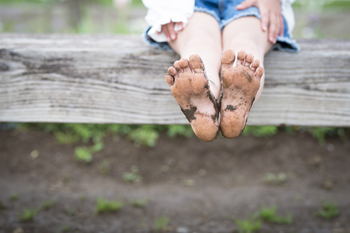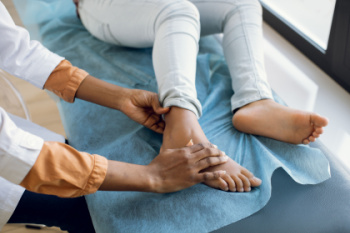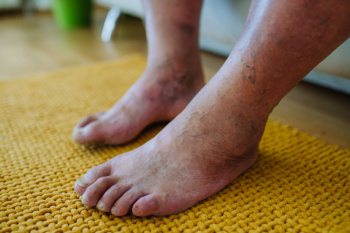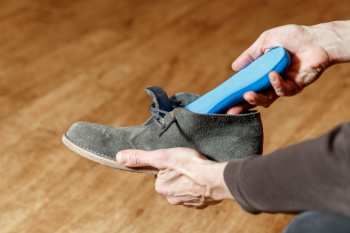Items filtered by date: March 2024
Children’s Growing Pains or Serious Foot Concern?
 Growing pains are a normal part of development in childhood. Children may experience mild aches or discomfort in the legs and feet due to the rapid growth phases they go through. Typically, these pains occur at night and don’t continue into the following day. However, when children’s foot pain deviates from these patterns, such as being localized, persistent, or severe, it may indicate a more profound issue. For instance, pain that worsens with activity could suggest Sever's disease, an inflammation of the heel's growth plate. Swelling, redness, or tenderness could point towards juvenile idiopathic arthritis. Something else may be amiss if there is a noticeable change in a child’s gait, like limping or reluctance to engage in previously enjoyed activities. If you’re unsure about whether your child is experiencing normal growing pains or something more, it is time for a visit with a foot doctor, otherwise known as a podiatrist. This type of doctor can diagnose any issues, and offer appropriate care and intervention to ensure the best foot health for your child.
Growing pains are a normal part of development in childhood. Children may experience mild aches or discomfort in the legs and feet due to the rapid growth phases they go through. Typically, these pains occur at night and don’t continue into the following day. However, when children’s foot pain deviates from these patterns, such as being localized, persistent, or severe, it may indicate a more profound issue. For instance, pain that worsens with activity could suggest Sever's disease, an inflammation of the heel's growth plate. Swelling, redness, or tenderness could point towards juvenile idiopathic arthritis. Something else may be amiss if there is a noticeable change in a child’s gait, like limping or reluctance to engage in previously enjoyed activities. If you’re unsure about whether your child is experiencing normal growing pains or something more, it is time for a visit with a foot doctor, otherwise known as a podiatrist. This type of doctor can diagnose any issues, and offer appropriate care and intervention to ensure the best foot health for your child.
The health of a child’s feet is vital to their overall well-being. If you have any questions regarding foot health, contact Kentston Cripe, DPM of Roseville Foot & Ankle. Our doctor can provide the care you need to keep you pain-free and on your feet.
Tips for Keeping Children's Feet Healthy
- Make sure their shoes fit properly
- Look for any signs of in-toeing or out-toeing
- Check to see if they have Clubfoot (condition that affects your child’s foot and ankle, twisting the heel and toes inward) which is one of the most common nonmajor birth defects.
- Lightly cover your baby’s feet (Tight covers may keep your baby from moving their feet freely, and could prevent normal development)
- Allow your toddler to go shoeless (Shoes can be restricting for a young child’s foot)
- Cut toenails straight across to avoid ingrown toenails
- Keep your child’s foot clean and dry
- Cover cuts and scrapes. Wash any scratches with soap and water and cover them with a bandage until they’ve healed.
If you have any questions, please feel free to contact our office located in Roseville, CA . We offer the newest diagnostic and treatment technologies for all your foot care needs.
Diabetes and Charcot Foot

For individuals with diabetes and peripheral neuropathy, the threat of Charcot foot looms ominously. This complication, stemming from nerve damage, demands attention and prompt intervention to avoid severe consequences like foot ulcers or even amputation. Diabetes wreaks havoc on nerve function, impairing the transmission of signals from the brain to the lower limbs and feet. The insidious nature of neuropathy means that injuries, or bone fractures in the feet can go unnoticed, as diminished sensation impedes pain detection. Consequently, continued weight-bearing on the affected foot can deform bones and joints, setting the stage for the progression of Charcot's foot. Signs of Charcot foot include swelling, warmth, and changes in foot color and shape. If any of these indicators emerge, it is imperative to alleviate pressure on the affected foot immediately. Both surgical and non-surgical treatments are available for managing Charcot foot. For more information on dealing with these conditions, it is suggested that you schedule an appointment with a podiatrist.
Some foot conditions may require additional professional care. If you have any concerns, contact Kentston Cripe, DPM of Roseville Foot & Ankle. Our doctor can provide the care you need to keep you pain-free and on your feet.
Rare Foot Conditions
The majority of foot conditions are common and can be treated by a podiatrist. Standard diagnostic procedures are generally used to identify specific conditions and treatment can be rendered. A podiatrist also treats rare foot conditions which can be difficult to diagnose and may need extra attention and care.
There are many rare foot conditions that can affect children. Some of these can include:
- Freiberg’s disease
- Kohler’s disease
- Maffucci syndrome
Freiberg’s disease - This can be seen as a deterioration and flattening of a metatarsal bone that exists in the ball of the foot. It typically affects pre-teen and teenage girls, but can affect anyone at any age. Symptoms that can accompany this can be swelling, stiffness, and the patient may limp.
Kohler’s disease - This often targets the bone in the arch of the foot and affects younger boys. It can lead to an interruption of the blood supply which ultimately can lead to bone deterioration. The patient may limp or experience tenderness, swelling, and redness.
Maffucci syndrome - This affects the long bones in a child’s foot leading to the development of abnormal bone lesions. They are benign growths and typically develop in early childhood and the bones may be susceptible to breaking.
A podiatrist can properly diagnose and treat all types of rare foot conditions. If your child is affected by any of these symptoms or conditions, please don’t hesitate to call our office so the correct treatment method can begin.
If you have any questions please feel free to contact our office located in Roseville, CA . We offer the newest diagnostic tools and technology to treat your foot and ankle needs.
Preventing Diabetic Foot Ulcers

Diabetes requires ongoing medical care beyond controlling blood sugar. Foot ulcers, a common complication, pose serious health risks. 19% to 34% of people with diabetes are likely to develop a foot ulcer at least once in their lifetime. There is a 2% yearly incidence of diabetic patients developing foot ulcers, with high recurrence rates after healing. Poor foot care raises the risk of a diabetic patient developing ulcers, infections, and amputations. Studies show varied foot care practices globally can contribute to injury risk. These include infrequent foot and shoe checks, inadequate foot hygiene, and walking barefoot. To reduce diabetic foot complications, patients need education on proper foot care, regular check-ups, and to avoid risky behaviors, like walking barefoot or wearing improper footwear. If you are a diabetic, it is strongly suggested that you make regular visits with a podiatrist for routine examinations and care.
Diabetic foot care is important in preventing foot ailments such as ulcers. If you are suffering from diabetes or have any other concerns about your feet, contact Kentston Cripe, DPM from Roseville Foot & Ankle. Our doctor can provide the care you need to keep you pain-free and on your feet.
Diabetic Foot Care
Diabetes affects millions of people every year. The condition can damage blood vessels in many parts of the body, especially the feet. Because of this, taking care of your feet is essential if you have diabetes, and having a podiatrist help monitor your foot health is highly recommended.
The Importance of Caring for Your Feet
- Routinely inspect your feet for bruises or sores.
- Wear socks that fit your feet comfortably.
- Wear comfortable shoes that provide adequate support.
Patients with diabetes should have their doctor monitor their blood levels, as blood sugar levels play such a huge role in diabetic care. Monitoring these levels on a regular basis is highly advised.
It is always best to inform your healthcare professional of any concerns you may have regarding your feet, especially for diabetic patients. Early treatment and routine foot examinations are keys to maintaining proper health, especially because severe complications can arise if proper treatment is not applied.
If you have any questions please feel free to contact our office located in Roseville, CA . We offer the newest diagnostic and treatment technologies for all your foot and ankle needs.
Are Bunions Affecting Your Everyday Life?
Benefits of Custom Orthotics for Older Adults

Many older adults have foot and ankle problems that affect their daily activities, balance, and quality of life. These issues, like dry skin, reduced joint movement, and weak feet, often lead to foot deformities, pain, and difficulty walking. Ankle-foot orthoses, or AFOs, are commonly used to help with these problems by supporting joints and improving stability. Custom-made orthotics align the foot, reduce pain, and encourage more physical activity. They can help improve balance and possibly reduce the fear of falling as well. If you are an older adult and are experiencing foot problems, or have a desire to prevent age-related foot conditions from interfering with life, it is suggested that you schedule an appointment with a podiatrist to discuss if custom-made orthotics are the right choice for you. Custom-made orthotics can lead to better balance and more activity, especially for those who wear them consistently.
If you are having discomfort in your feet and would like to try orthotics, contact Kentston Cripe, DPM from Roseville Foot & Ankle. Our doctor can provide the care you need to keep you pain-free and on your feet.
What Are Orthotics?
Orthotics are inserts you can place into your shoes to help with a variety of foot problems such as flat feet or foot pain. Orthotics provide relief and comfort for minor foot and heel pain but can’t correct serious biomechanical problems in your feet.
Over-the-Counter Inserts
Orthotics come in a wide variety of over-the-counter inserts that are used to treat foot pain, heel pain, and minor problems. For example, arch supports can be inserted into your shoes to help correct overarched or flat feet, while gel insoles are often used because they provide comfort and relief from foot and heel pain by alleviating pressure.
Prescription Orthotics
If over-the-counter inserts don’t work for you or if you have a more severe foot concern, it is possible to have your podiatrist prescribe custom orthotics. These high-quality inserts are designed to treat problems such as abnormal motion, plantar fasciitis, and severe forms of heel pain. They can even be used to help patients suffering from diabetes by treating foot ulcers and painful calluses and are usually molded to your feet individually, which allows them to provide full support and comfort.
If you are experiencing minor to severe foot or heel pain, it’s recommended to speak with your podiatrist about the possibilities of using orthotics. A podiatrist can determine which type of orthotic is right for you and allow you to take the first steps towards being pain-free.
If you have any questions please contact our office located in Roseville, CA . We offer the newest diagnostic and treatment technologies for all your foot and ankle needs.

